French Caricature: French Artists
Grandville (1803-1847)
Grandville is the name used by Jean Ignace Isidore Gérard, a caricaturist, lithographer, and illustrator who was born in Nancy and moved to Paris in the late 1820s. After the French Revolution of 1830 he contributed over 200 designs to two periodicals edited by Charles Philipon, La Caricature, a scathing weekly periodical, and Le Charivari, a daily paper.29
His political satires harshly criticized the new government as being no better than the government it replaced. When increasingly draconian censorship laws caused the closure of La Caricature in 1835, Grandville turned his talents to illustrating books. He created the drawings for Gulliver’s Travels by Jonathan Swift and Robinson Crusoe by Daniel Defoe. He produced over 3,000 prints, engravings, and lithographs during his career.30 His personal life was marred by misfortunes, including the deaths of his three children and first wife. Affected by depression after his third child died, Grandville seemingly was also afflicted with a throat infection and died at a private medical clinic in March 1847.31
He wrote his own epitaph, “Here lies Grandville; he gave life to everything and made everything move and speak. The one thing is, he didn’t know how to make his own way.”32
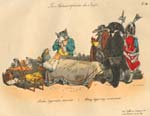
Les Métamorphoses du Jour. No. 14. Misére, hypocrisie, convoitise. Misery, hypocrisy, covetou[s]ness. Lith. de Langlume. Chez Bulla, rue St. Jacques, No. 38. Et chez Martinet, rue du Coq. (10 5/8″h x 14″w)
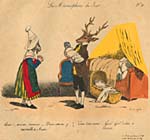
Grandville, Les Métamorphoses du Jour. No. 11., Arrivez, arrivez, mourrice. _ Dieux comme y Ressemble a Mosieu! Come, Come nurse. _ Good Good! what a likeness. Lith. de Langlume, Chez Bulla, rue St. Jacques No. 38. et chez Martinet, rue du Coq. (10 7/8″h x 14 1/4″w)
Louis-Léopold Boilly (1761-1845)
Louis-Léopold Boilly was born in La Bassée, a village in northeastern France. He moved to Paris in 1786 where he successfully began his illustrious career as a painter and lithographer from the end of the Ancien Régime into the early July Monarchy. He is credited with drawing the first dated French lithograph in 1802 and depicted over 5,000 heads in his artwork.33 Boilly adapted to the rapidly evolving political conditions, and his broad range of work suggests that he was aware of what appealed to the urban collector of the post-Revolutionary period.34 Near the age of retirement, he sold his painting business and became an investor in mortgage loans.35
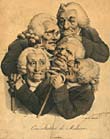
Consultation de Medecins, 1760. L. Boilly, G. lith. de Delpech. (12 1/8″h x 9 1/4″w)
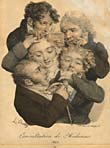
Consultation de Mèdecins. 1823. 16, L. Boilly, G. lith. de Delpech. (12 3/8″h x 9″h)
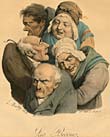
Les Bossus. L. Boilly, 1827. G. lith. de Delpech, 1827. (11 1/2″h x 8 1/2″w)
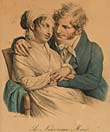
Le Neuvieme Mois. L. Boilly. (11 1/4″h x 9 1/2″w)
Edme Jean Pigal (1798-1873)
Edme Jean Pigal was a Parisian painter and lithographer. He created prints satirizing customs and social types, making fun of both the lower and middle classes. He had caricatures published in La Silhouette, La Caricature, and Le Charivari, but unlike Grandville, was an irregular contributor and was not noticeably political. An accurate chronology of Pigal’s lithographs is not possible, but generally his backgrounds became less bare over time. Those done to sell as single sheets were usually hand-colored. In the late 1830s Pigal did less lithography and more paintings, concentrating on religious and historical themes. He also did commissioned work for the Ministry of the Interior.36
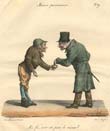
Mœurs parisiennes. No. 29. Pigal, Chez Gihaut et Martinet, Lith. de Langlumé, Ma foi, tout est pour le mieux! (14 1/4″h x 10 3/4″w)
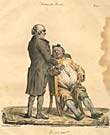
Scènes de Société. No. 16. Pigal, Chez Gihaut et Martinet, Lith. de Langlumé, Ça va mal!! (13″h x 10″w)
L Noël
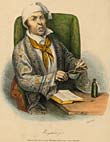
En gouterai je? L Noël, Lithog: de F. Noël. Publié par Giraldon – Bovinet et Compie, Mds d’estampes, Commissionnaires, rue Pavée St. André, No. 5. (13″h x 9 3/4″w)
Unknown
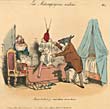
La Métempsycose réalisée. No. 2. Mais docteur je cuis dans mon bain. á Bruxelles chez Daem[ll?], et á Paris, chez Méant, fils, rue St. Antoine, No. 9. (7 7/8″h x 9 5/8″w)
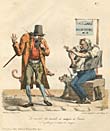
A. D. [?], Noël rue St. Jacques N 16, Lith. de Langlumé r. de l’Abbaye N, La moitie du monde se moque de l’autre, Ou la pelle qui se mocque du fourgon. Noël et Dauty éditeur Galerie de Nemours Palais Royal. (13 5/8″h x 10 1/4″w)
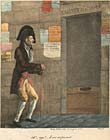
Genty, Editeur; Rue St. Jacques, No 33. Béraud, Ah!… aye!… le cas est pressant. (11 1/2″h x 9″w)